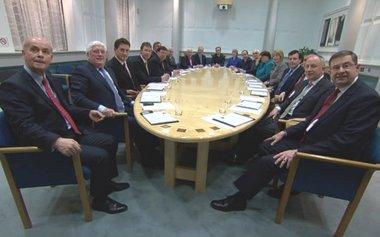Politics without friendship highlights problems

What is it about politics that so few people make lasting friendships through their work? By Vincent Browne.
Politicians are, in the main, nice guys (and girls).
Yes, there are some nasty people in politics, but in general, they are personable and nice. People who you’d be happy to have a drink with - and that’s the test, isn’t it? The reason is obvious: most of them would not have been elected were they not nice people.
Most of them are able, too. And most of them are genuine, seeking to improve things for their constituents and for the populace generally. It is not the integrity or competence of politicians that I think is the issue, but rather their politics - what they stand for - and what they do.
But I don’t want to get into the politics and ideology of all that now in the middle of August, nor dwell on another theme I bang on and on about: the irrelevance of the Dáil and the unaccountability of government.
Instead, I draw attention to the incongruity that, while most politicians are nice, personable, sociable people, very few of them make lasting friendships in politics. Take, for instance, our former taoisigh who, you’d think, were the most personable and likeable of all.
I don’t think Sean Lemass was close to any of his political contemporaries. He seems to have fraternised with people outside politics entirely, mainly business people with whom he played cards and sometimes golf. Jack Lynch was personally close to Des O’Malley, but I don’t think he was close to anybody else in politics.
Charles Haughey was close to Donogh O’Malley and Brian Lenihan, but when O’Malley died suddenly in 1968, I think Haughey’s friendship ended with Lenihan as well. He hardly ever socialised with other politicians when he was taoiseach; his friends were old school mates and neighbours in Malahide.
Garret FitzGerald made no lasting friends in politics either. His friends are, in the main, from academia - with some from the media - and when he was in politics, the late Alexis FitzGerald and Jim Dooge, who was foreign minister briefly, were his closest associates.
Albert Reynolds may be different, but not that much so. John Bruton’s only real friend in politics, aside from his brother, was Enda Kenny.
Bertie Ahern famously had no politicians within his inner social circle. Brian Cowen does have several friends in politics, in large part because he has been in the Dáil and on the backbenches for so long, but I wonder how many of these will remain friends when he is gone from politics?
Outside the top echelon, there are some lasting political friendships, sometimes across party lines but, I suspect, not many.
So what is it about politics that so few of these very sociable and personable people make lasting friendships through their work, where most of us form friendships?
Of course, it has a bit to do with the reality that politicians are dispersed around the country, so that, even if friendships are formed while in the Dáil, they evaporate afterwards for geographic reasons.
But even when they are in the Dáil, few politicians would go on holiday together, socialise at weekends or go for walks together. Yes, during the weeks when the Dáil is sitting, they have drinks together and eat together in the Dáil restaurant, but outside that?
The competitive element corrodes friendships. Politicians in the same constituency rarely become close friends, particularly if they are in the same party. And politicians from differing constituencies are often in competition, whether due to inter-party rivalry or, worse still, internal party rivalry.
This friendless aspect of politics must itself influence politics. It must erode the sense of solidarity that is part of the societies most of the rest of us live in, and that politicians live in outside politics.
The absence of this friendly dimension may add to a vibe in politics that sees ‘‘the life of man, solitary, poor, nasty, brutish and short’’, in the words of Thomas Hobbes.
The writer had a bleak view of human nature, believing that we are all disposed to warfare to promote our own personal interests. His solution was agreement on the appointment of an absolute sovereign with absolute powers, accountable to nobody.
It would be pushing it to suggest that our politicians have adopted a Hobbesian perspective, because of the friendless culture of politics, but it hardly helps them to see social relations in terms of solidarity. Politicians often talk of ‘‘us being in all this together’’ when there is a crisis - no talk of that during the Celtic tiger era. Brian Cowen likes the meitheal metaphor, but that is just more rhetoric. Anyway, the meitheal wasn’t all it is cracked up to be; farm workers didn’t have much say in the meitheal!
I’ve got a solution to the politicians’ dilemma: term limits. Nobody should be elected more than twice, thereby ensuring a huge turnover and the involvement of many more people in the business of politics. It would be good for society - and it might be good for politicians, too.
